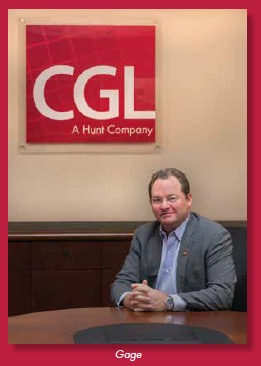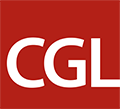
“CGL Celebrates 5-Year Anniversary” – Correctional News
*This interview appears in the November-December 2017 issue of Correctional News Magazine (“CN”).
***
CN: CGL started out with large marketing efforts and by hiring a lot of “big” names in the industry. Did this help or hurt the company, and how has CGL developed over the past five years to maintain its established place in the market?
Gage: To answer your question, I think it helped. Remember, rolling up six companies in seven months in the criminal justice space had never been done before (there has been a lot of consolidation in the market since then, though). Our execution of that was arguably not perfect, and we learned a lot. Ultimately, though, I am certain that we are better as a result of that experience. CGL is highly focused on our core businesses with an eye toward P3 and alternative finance as those markets continue to develop. Hunt Companies, our parent company, adds significant value to that. We are a very different company now than we were five years ago.

CGL CEO Eli Gage
CN: Similarly, is it difficult to head a company with so many leaders in their perspective fields? How do you manage to still give a voice to all those involved in the company?
Gage: Nah, it’s easy. They make it easy (most days). But, over the last five years, we have flattened our executive management structure, incorporated an Emeritus Program, adopted a Regional Office Leader management structure and created subject matter directors. Ideally, a more defined structure gives everyone a voice.
CN: Can you tell me more about this Emeritus Program; does it refer to retirement?
Gage: Absolutely not; just ask Ken McGinnis. In lieu of retirement, it keeps our best and brightest industry veterans involved longer and allows them to focus their efforts on client development and interaction, mentoring younger staff and giving them the freedom to do some of the things that they are passionate about. They are all still very active and very much involved. They seem to like it, so I hope that it’s a win-win.
CN: How has CGL’s focus changed or progressed over the past five years, and where do you see the company heading in the next five?
Gage: As I mentioned before, we are definitely more focused on our core business now, while always looking to see how we can leverage our multiple discipline approach. Arguably, we are also much more conservative than we may have been in the past. Again, we’ve learned a lot. We are more committed to strengthening our partner relationship, working with those firms that we’ve done great work with in the past. I think there was a perception that we were building a company to compete with our partner firms, but we’re not. Our model is different. We’ve spent considerable time on right sizing our business, understanding the nature of this market and recently learning more about what value we have within the company that we haven’t utilized to our full advantage.
One example of that is the years of data that we have collected from the consulting side of our business and the Computerized Maintenance Management Systems that we use in our Facility Management division. There is a lot of information there that we can use to find interesting trends for this market. We think we can use that data to benefit our clients and help them save money. Our focus over the next five years will be on our clients.

CN: Do you think providing multiple services under one company name is beneficial? What do you say to people who say the company is doing too much?
Gage: I believe that this new model is definitely a benefit, and while we do have four legs to our stool, including Planning and Design, Program Management, Facility Management, and Development and Finance, when the sum of those parts all work together, it can be very beneficial to our clients. We can add value for clients like the Richmond City Justice Center in Virginia and Forsyth County, Ga., by sitting at the table with them early, taking them through planning into the role as Owner’s Representative and, in some cases, ultimately maintaining their facility. We can affect the long-term operations of the facility at the beginning of the project before it becomes a problem. This has been proven to add value and build trust. Doing too much? I don’t think we’re doing enough. This market is changing every day; to grow, we need to change with it.
CN: What were some of the main goals for the company to really break free from Carter Goble Lee and rebrand as CGL? How are you continuing those efforts in order to build a legacy for CGL?
Gage: We never want to “break free” from the legacy of our founding companies. It’s too valuable. We have more than 45 years of history in this market. The institutional knowledge is amazing. While CGL does look a lot like Carter Goble Lee shortened, keep in mind that our founding companies also include firms such as Robert Glass & Assoc., RicciGreene, Carter Goble Associates — all very different companies with different values, visions and expertise — and that’s the beauty of it. We respect those and want their “best practices” to impact CGL. Ultimately, we want to simplify who we are — we are one company, with one name. In essence, we are a five-year-old start-up with 45 years of experience.
CN: Do you find that owners want to contract with the company for multiple components of the project (i.e., planning, design, maintenance, financing), or does one department really dominate over the others (in terms of securing contracts)?
Gage: Yes, we are sometimes precluded from competing for work. Honestly, making clients aware of the multiple services that we offer is often the biggest hurdle. They may know us as their architect; they may know us as their planner or their FM provider; they may not know that we offer a full spectrum of justice services. The owners that have realized the economies of scale are usually quick to realize the true value. To answer your question, we don’t find owners averse to contracting with one company for multiple services. We spend a great deal of time strategizing over what is our best “offering” for a particular client.
CN: Tell me about a current project CGL is working on that shows how the company’s expertise is really helping to provide the owner with the best possible opportunities for success.
Gage: The Richmond City Justice Center in Virginia is a project that is personally near and dear to my heart. We started the planning work there 15 years ago. We then acted as their Owner’s Rep to get it built, and now, we maintain the facility for the city of Richmond. I’ve been fortunate to watch this project most of the way, and what impresses me is the level of trust that we have developed with the city, the sheriff and his staff. We all truly look at it as a partnership and that makes everyone want to do his or her best.
CN: What does CGL see as some of the biggest challenges in the current marketplace? How does this impact the company, and what can be done to solve these issues?
Gage: Finding good people and guiding our clients through the ever-changing challenges that the industry faces. Solutions for our criminal justice system are changing quickly right now with political shifts, changes in the sentencing laws, incarcerated demographics, struggling public agency budgets and large unmaintained public infrastructure. We’ve all talked about this, but finding good people and mentoring the ones that we have will be important as these changes become mainstream. As a company, we believe that we are ideally suited to help manage that change.
